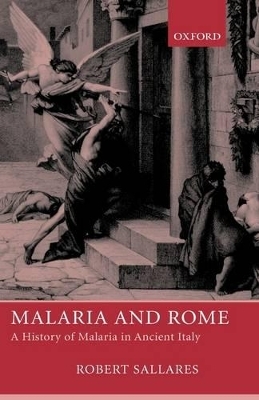
Malaria and Rome
A History of Malaria in Ancient Italy
Seiten
2002
Oxford University Press (Verlag)
978-0-19-924850-6 (ISBN)
Oxford University Press (Verlag)
978-0-19-924850-6 (ISBN)
Malaria and Rome explores the evolution and ecology of malaria, its medical and demographic effects on human populations in antiquity, its social and economic effects, the human responses to it, and the human interpretations of it. It argues that malaria became increasingly prevalent in Roman times.
Malaria and Rome is the first comprehensive study of malaria in ancient Italy since the research of the distinguished Italian malariologist Angelo Celli in the early twentieth century. It demonstrates the importance of disease patterns and history in understanding the demography of ancient populations. Robert Sallares argues that malaria became increasingly prevalent in Roman times in central Italy as a result of ecological change and alterations to the physical landscape such as deforestation. Making full use of contemporary sources and comparative material from other periods, he shows that malaria had a significant effect on mortality rates in certain regions of Roman Italy.
Robert Sallares incorporates all the important advances made in many relevant fields since Celli's time. These include recent geomorphological research on the evolution of the coastal environments of Italy that were notorious for malaria in the past, biomolecular research on the evolution of malaria, ancient DNA as a new source of evidence for malaria in antiquity, the differentiation of mosquito species that permits understanding of the phenomenon of anophelism without malaria (where the climate is optimal for malaria and Anopheles mosquitoes are present, but there is no malaria), and recent medical research on the interactions between malaria and other diseases.
The argument develops with a careful interplay between the modern microbiology of the disease and the Greek and Latin literary texts. Both contemporary sources and comparative material from other periods are used to interpret the ancient sources. In addition to the medical and demographic effects on the Roman population, Malaria and Rome considers the social and economic effects of malaria, for example on settlement patterns and on agricultural systems. Robert Sallares also examines the varied human responses to and interpretations of malaria in antiquity, ranging from the attempts at rational understanding made by the Hippocratic authors and Galen to the demons described in the magical papyri.
Malaria and Rome is the first comprehensive study of malaria in ancient Italy since the research of the distinguished Italian malariologist Angelo Celli in the early twentieth century. It demonstrates the importance of disease patterns and history in understanding the demography of ancient populations. Robert Sallares argues that malaria became increasingly prevalent in Roman times in central Italy as a result of ecological change and alterations to the physical landscape such as deforestation. Making full use of contemporary sources and comparative material from other periods, he shows that malaria had a significant effect on mortality rates in certain regions of Roman Italy.
Robert Sallares incorporates all the important advances made in many relevant fields since Celli's time. These include recent geomorphological research on the evolution of the coastal environments of Italy that were notorious for malaria in the past, biomolecular research on the evolution of malaria, ancient DNA as a new source of evidence for malaria in antiquity, the differentiation of mosquito species that permits understanding of the phenomenon of anophelism without malaria (where the climate is optimal for malaria and Anopheles mosquitoes are present, but there is no malaria), and recent medical research on the interactions between malaria and other diseases.
The argument develops with a careful interplay between the modern microbiology of the disease and the Greek and Latin literary texts. Both contemporary sources and comparative material from other periods are used to interpret the ancient sources. In addition to the medical and demographic effects on the Roman population, Malaria and Rome considers the social and economic effects of malaria, for example on settlement patterns and on agricultural systems. Robert Sallares also examines the varied human responses to and interpretations of malaria in antiquity, ranging from the attempts at rational understanding made by the Hippocratic authors and Galen to the demons described in the magical papyri.
Robert Sallares is Research Fellow in Biomolecular Sciences, UMIST
1. Introduction ; 2. Types of malaria ; 3. Evolution and prehistory of malaria ; 4. The ecology of malaria in Italy ; 5. The demography of malaria ; 6. The Pontine Marshes ; 7. Tuscany ; 8. The city of Rome ; 9. The Roman Campagna ; 10. Apulia ; 11. Geographical contrasts and demographic variation
| Erscheint lt. Verlag | 1.10.2002 |
|---|---|
| Zusatzinfo | 37 photographs and 21 maps in-text |
| Verlagsort | Oxford |
| Sprache | englisch |
| Maße | 145 x 224 mm |
| Gewicht | 630 g |
| Themenwelt | Geschichte ► Allgemeine Geschichte ► Vor- und Frühgeschichte |
| Geisteswissenschaften ► Geschichte ► Regional- / Ländergeschichte | |
| Geisteswissenschaften ► Sprach- / Literaturwissenschaft ► Anglistik / Amerikanistik | |
| Geisteswissenschaften ► Sprach- / Literaturwissenschaft ► Literaturwissenschaft | |
| Studium ► Querschnittsbereiche ► Geschichte / Ethik der Medizin | |
| Studium ► Querschnittsbereiche ► Infektiologie / Immunologie | |
| ISBN-10 | 0-19-924850-8 / 0199248508 |
| ISBN-13 | 978-0-19-924850-6 / 9780199248506 |
| Zustand | Neuware |
| Haben Sie eine Frage zum Produkt? |
Mehr entdecken
aus dem Bereich
aus dem Bereich
auf den Spuren der frühen Zivilisationen
Buch | Hardcover (2023)
C.H.Beck (Verlag)
20,00 €
Konzepte – Methoden – Theorien
Buch | Softcover (2024)
UTB (Verlag)
39,90 €
Was Pompeji über uns erzählt
Buch | Hardcover (2023)
Propyläen (Verlag)
32,00 €


